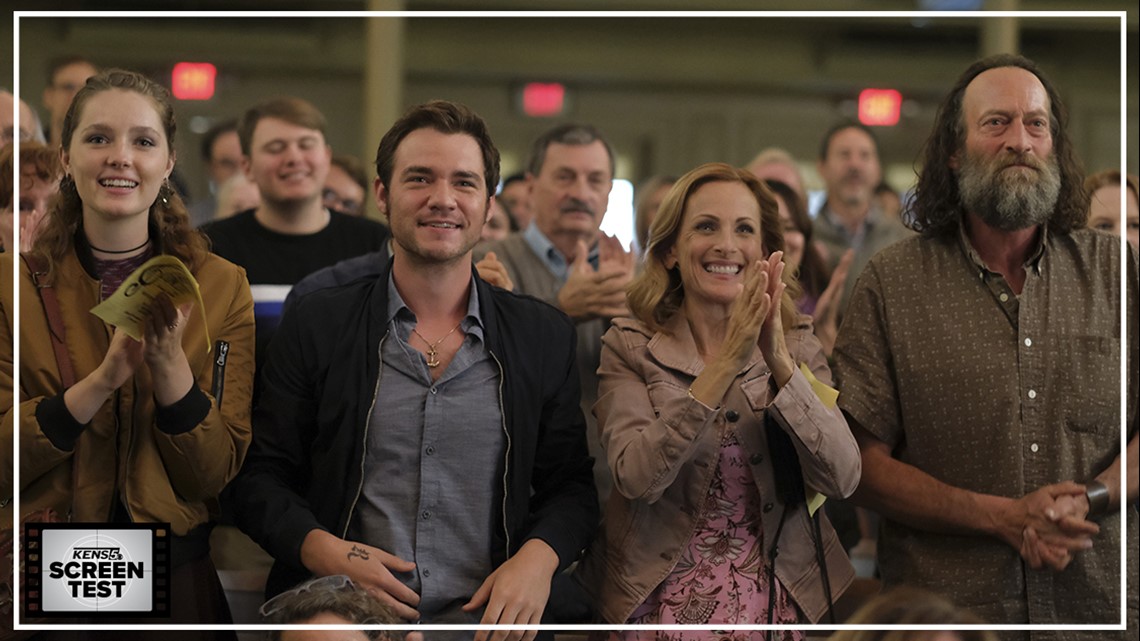A teenage girl has a gift for singing, and as a child of deaf adults, it isn’t being heard by many people.
You don’t need an Oscar-winning storyteller’s imagination to envision how that two-pronged conceit, a mere 22 words in all, would be enough to fuel a movie whose dramatic constellations can be spotted before they come into view. There’s Crisis Major and Crisis Minor glowing brightly...shift your gaze a bit, and you’ll spot the North Star of adolescent frustration, confidently guiding all prospective filmmakers who were adolescents themselves at one point or another.
And yet, the alignment of those stars proves mighty satisfying to witness in writer-director Siân Heder’s Sundance award-sweeping effort – whose acronym-as-title, “CODA,” is also glimpsed in that narrative premise above – because she knows there’s more than one way to build upon even the sturdiest of foundations. Her sophomore feature relies on formula (spunky lead? Check! Fraught family dynamics? Check!) without succumbing to it, which is just about as close to a minor miracle you can find in a movie as intended for mainstream audiences as this one is.
The girl is Ruby Rossi (Emilia Jones), a superstar-caliber name suggestive of the path she’s destined to take if only she could imagine herself doing more than helping out on the family’s fishing boat every morning before school. She’s used to the routine, to serving not just as an extra pair of hands for her father, Frank, and brother, Leo, (Troy Kotsur and Daniel Durant, respectively) but also as their ears and voice in a grind-it-out, take-home-what-you-can industry that will pop its blue collar before doing anything to accommodate its deaf workers. That Ruby clearly looks more at ease on the water than in her standard social jungle of a school (merciless peers? Check. Reliant bff? Check!) sets a stage for the film’s conflict, catharsis and Olympic-caliber heart-tugging to come....but first for a clever bit of situational comedy where Ruby shoots her parents a “This can’t be happening” look when they arrive to pick her up in a truck blasting hip-hop. They can’t hear the lyrics, but oh how they loooove to groove to the pulsing bass anyone with the ability to hear would take for granted.
Beyond our snickers, that early scene signals Heder’s sneakily empathetic approach to the material, one that affords its deaf characters an unabashed joy and carefree mentality that manages to pierce through the obviousness of everything surrounding it. Heder not only knows better than to exploit her characters’ disabilities for the sake of victimizing them; she remembers to root the melodrama that’s so integral to these crowd-pleasers in the everydayness of the Rossis, rather than the obstacles they’ve spent a lifetime defying. It’s that subtle tweak in storytelling perspective that gives “CODA” its sense of ingenuity and imperative amid the neat thumbtack-and-yarn plotting of a young girl weighing her priorities.
And those priorities are aplenty, between the family’s dire financial straits (check!), a fairly streamlined high school romance (check!), and Ruby learning to come into her own (check, check, check!). For the most part, Heder readily softens the sting of her drama when confrontations spark and frustrations fly, but the various players in her cast play off each other so strongly that you can’t help but anticipate what form the resolution will take, even if its arrival isn’t something to question. All the while, it doesn’t mistake its deaf representation as merely parenthetical.
Anyone who’s seen more than three movies in their life won’t have their jaws dropped by the filmmaking here, but by leveling it against a deaf community typically given short thrift in the movies, whether as a living gimmick (“Godzilla vs. Kong”) or as a committed but two-dimensional narrative engine (“Hush”), Heder’s movie finds fresh legs. As do the Rossis themselves. A familiar narrative buoyancy powers “CODA,” and Heder’s tendency to spring the proceedings too high for the stakes to follow only serves to show how deaf performers never get to operate within confines of genre convention as cozy as these.
For all the modesty Heder gives up for a story as unabashedly emotions-driven as “CODA” is, there’s something to be said for her decision to (mostly) let sequences of the Rossis signing with each other over the merits of Tinder-swiping as a family activity or the suspension of Frank’s fishing license play out without the distraction of a background score. That’s one feel-good-movie trope whose absence pays huge dividends here, specifically in allowing the frustrations, sarcasm and sincerity of the family’s journey to hit ever harder via the contact of hands on hands or palms on chests. The musically backed transitions in and out of these scenes aren’t always particularly smooth, but by the time “CODA” reaches its tear-inducing peak in the final act, we come to discover Heder has created an organic space for her screenplay’s impossibly winning use of Marvin Gaye’s “You’re All I Need To Get By.” Even if you roll your eyes at the sentimentality of it all, you’ll likely also leave with a recalibrated expectation for how characters with disabilities should be portrayed in the most evergreen of stories.


That can only be a good thing. Were it another time (20 years ago, say), another director (one with half-baked intentions) or a different cast (one of hearing actors playing deaf characters), “CODA,” for however familiar its contours’ shapes, would have likely been a much different, ill-advised work. It speaks to a general scarcity of deaf representation in the movies that certain moments take different dramatic detours than we might expect. Instead of seeing Ruby’s father shyly admit his lack of hearing when the fishing business hits turbulent waters, he makes a stand of defiance. In place of a maternal figure jumping to wholeheartedly support her daughter’s newfound passions, Marlee Matlin’s Jackie Rossi waves it off out of a fear that it will lead to Ruby’s departure. Leo, meanwhile, has his own anxieties to deal with as he rides a narrative arc which, if not as well-defined as Ruby’s, proves Heder’s commitment to giving each of the family members as much depth as a 111-minute movie could allow for without feeling constricting. “CODA” so thoroughly makes good on its merits by embracing that it isn't just showing us Ruby’s journey of discovery, but the journeys undertaken by her parents and brother as well.
Tempted as we may be to slot her movie alongside “Sound of Metal” and “A Quiet Place,” two other recent releases putting deaf representation front and center, you get the sense Heder is attempting to defy that impulse with a film that never threatens to define itself by its focus on deaf characters. It’s all matter-of-fact, and all the more a benchmark in representational storytelling because of it. The best thing about “CODA,” the thing about it that will endure long after you’ve thrown away an empty box of tissues, is how it plays like we’ve had these movies the whole time.
"Coda" is rated PG-13 for strong sexual content and language, and drug use. It's now showing in some theaters, as well as on Apple TV+.
Starring: Emilia Jones, Marlee Matlin, Troy Katsur, Daniel Durant
Directed by Siân Heder
2021
MORE REVIEWS:
- ‘Days’ Review: A slow-cinema mosaic of urban isolation and tender connection
- ‘The Green Knight’ Review: The best movie of 2021 so far is a magical and masterful deconstruction of legend
- ‘Jungle Cruise’ Review: Emily Blunt, Dwayne Johnson cheerily host a voyage to nowhere
- ‘Nine Days’ Review: A poetically crafted but narratively oversimplified exploration of life’s meaning
- ‘Old’ Review: M. Night Shyamalan is back to his gloriously weird ways
- ‘Settlers’ Review: Scrappy sci-fi-Western shows promise for budding filmmaker
- ‘Space Jam: A New Legacy’ Review: Drafting the best and worst parts of a selectively self-absorbed sequel

